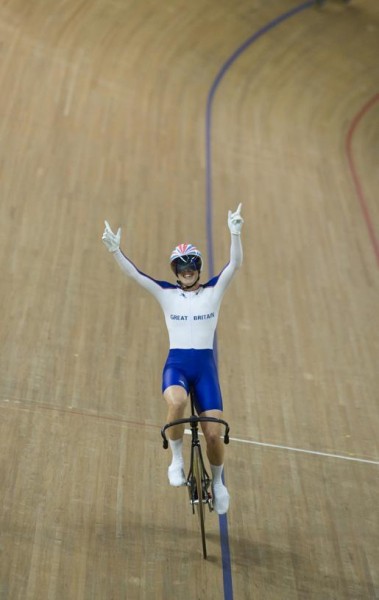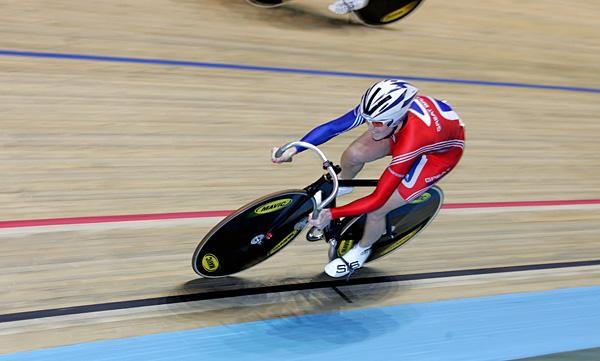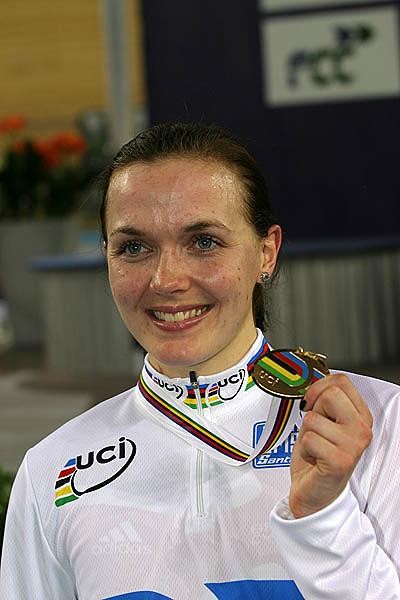Victoria's Secrets: Victoria Pendleton talks exclusively
In the past twelve months British sprint superstar Victoria Pendleton experienced the most successful season of her illustrious career.



Reflecting on her golden year the World and Olympic champion spoke to Cyclingnews about Olympic come down, FHM and the future of British track cycling.
Cyclingnews.Com: Before we start talking about the track there’s something we need to ask you. Last September we saw you modelling for Stella McCartney and you’ve graced the cover of FHM in recent months. Any plans to swap the podium for the catwalk?
Victoria Pendleton: (Laughing) No I don’t think so. My modelling takes too much airbrushing to be of any commercial value to anybody. Besides I’ve got too many scars and stuff to cover up, it takes them too long.
CN: Those engagements came about after you were catapulted into the British nation’s consciousness after the team’s success in Beijing. In a post-Olympic year athletes often report a sense of come down, have you experienced any of this yourself?
VP: Definitely. I’ve really struggled and I think it was hard because we came straight off Beijing and everyone started talking about 2012. You’re thinking ‘woah, it’s another four years down the line and you’re already asking me what I’m going to do there.’ Give me a break.
I’ve had a lot of commitments obviously, sponsorship, media and that sort of thing which has made training a lot harder. When I’m not training in a structured sort of way I tend to get really agro.
CN: Do you think your profile makes it harder or easier than others on the team?
Get The Leadout Newsletter
The latest race content, interviews, features, reviews and expert buying guides, direct to your inbox!
VP: Harder, without a doubt. But it’s a case of you making hay while the sun shines. You can’t ever guarantee that you’re ever going to back up a performance like that, so it’s just trying to make the most of it, make a name for yourself and do what you can.
CN: The British press were quite critical, not so much of you, but of the British team’s performance at the World Championships in March. What was the team’s response to that?
VP: Oh, I wasn’t really bothered to be honest. I’d said that I wanted to be part of the World’s team prior to the Olympics so I’d committed myself. I felt it was my duty to continue that far. A lot of people on the team just took a break [after the Olympics] and to be honest, looking back, I can understand why. Probably the hardest thing I’ve ever had to do is juggle my commercial and sponsorship commitments with training and trying to be the best in the world. It really sucked.
The response from the press was really irrelevant; I’d achieved what I’d wanted to. Obviously, I’d have liked more gold medals than just one, being the greedy person that I am but I really felt I did my best. Retaining the sprint title and being the only person to do so after the Olympics was important to me.
CN: Well, you looked exhausted after the sprint final.
VP: I was, oh my god, I wasn’t even that sad, I was just so relieved it was over and that I could go on holiday. That was it really. It was just utter relief; it was a real battle to the end. It was such a contrast to the form I was in at the Olympics but that’s the best I could do with the situation I’d been put in.
CN: You mention the relief at being able to go on holiday, what have you been up to since March?
VP: I did the FHM interview and then headed off on holiday to Australia, with my boyfriend. I spent a couple of weeks out there with him. We did loads of cool stuff, went to national parks, climbed the Sydney harbour bridge, and just generally kicked back. It was nice, I need it so desperately. I really enjoyed not wearing lycra, you know, wearing dresses and high heels and being a girl. Doing all the things I hadn’t had a chance to do for so long.
CN: Were you recognised or was it a good chance to be anonymous for a little while?
VP: Oh, I’m totally anonymous still. Sometimes people take a second look at me like they’ve vaguely seem me before but I really don’t get recognised apart from at my local supermarket.
CN: Looking at the future of the women’s team, there are some younger girls coming through like Lizzie Armitstead. Is there anyone in the new generation that you would tip for the future?
VP: Well I think Lizzie is an awesome talent. I’d put money on her being world champion before you know it. She’s got a lovely little racing style and a really fresh, enthusiastic approach to it. To be honest, I’ve maybe got, in my old age (laughs), a bit bitter and twisted about the whole thing but it’s really good to see someone so enthusiastic and so talented getting stuck in. She doesn’t see any barriers for herself, which is such a good thing in a female athlete.
CN: Do you find yourself mentoring her?
VP: She doesn’t need it; she’s a talent all on her own. I talk to her obviously and we do chat about things and she asks me millions of questions, but she doesn’t need any help. She’ll make it all on her own soon enough. If there’s anything I can do to help her I’d do it, believe me, but I don’t think she needs any help.
CN: Do you feel threatened by anyone who’s coming through?
VP: Not at all. I know that my career won’t last for ever, there’ll be a day when I will get beaten and I’ll get beaten more and more. I’ll have to just retire, that’s just the way it goes. You can’t be at the top of your game forever. It’s a very limited lifespan, I 100 per cent accept that.
I’m just happy that the girls are doing much more on the team. We’ve got female [riders] that can, hopefully, go from strength to strength from now on. The team’s never had more female participants in it and I think that’s a great thing. If I’ve helped girls get involved with cycling or in sport then I feel that my job is done already.
CN: Have you resumed training in preparation for the new season?
VP: I have but I’m contemplating not even hitting this season very hard and ambling through in preparation for the next three years.
CN: You’re obviously taking a very philosophical approach to everything. What then is the motivation for you each day at training?
VP: I don’t have anything to prove, to be honest, that’s the thing. It is hard to be motivated when you’ve achieved everything in your wildest dreams, which is basically what I’ve done. Obviously I don’t like the idea of other people winning while I’ve still got a chance. It sounds bad but I’m quite satisfied in my achievements to date. I’ve achieved more that I ever dreamed of when I started cycling.
CN: Are you still working closely with [British Cycling’s psychologist] Steve Peters?
VP: No, I don’t really see him that often anymore. To be honest, most of his work with me is done. He occasionally taps in and asks: How’s it going? What are you up to? Are you alright? [But] I don’t really do much structured work with him, to be honest.
I think when you’re an athlete and you’re so used to that environment, it’s very easy to get a warped sense of what reality is. You know, I’m not going to die if I don’t win, I’m a healthy individual, I’m luck to be sound mentally (laughs), I’m in good physical condition, I have a family that supports me, I’m in a team that has good ideas and are willing to help me as much as possible. I couldn’t be in a better position really.
CN: Obviously, a lot can happen between now and 2012. Is there a plan laid out or is it too far away to be thinking about already?
VP: It’s hard not to have it at the front of my mind because it’s not just a topic within the team. In the media, that’s all we’re talking about now. It is a big part of the UK’s future in the sport so it’s hard to avoid the subject. It’s not going away, that’s for sure.
In terms of performance I’m not really trying to focus on it that much because it’s one step at a time, it’s a long way off in terms of preparation, so who knows, just take it day by day, do what I can, look for ways to improve and see how I’m faring in 2010 before I make any judgements or assumptions.
CN: In the last year Sky’s increased sponsorship of British cycling has been welcome news. Yourself involved with the Sky HD+ track team. Does that become a greater priority this year?
VP: Maybe. I mean I’ve got commitment to Sky obviously which I have to fulfil. Everything’s changed a little bit; it’s a very different approach now in [track] cycling. When you have sponsors like Sky on board it does become a bit more like a business. Priorities do change, it’s difficult to explain. The only thing I can compare it to is road cycling and their sponsorship because in track cycling we’ve never really experienced anything like this before.
CN: It has created the opportunity for track riders to make a career out of their sport. It must be a good thing for the sport?
VP: People who juggle their career and a sport as two separate entities I really take my hat off to them because I couldn’t do it. To reach the top of their game in that sort of situation is a phenomenal achievement. I think giving youngsters something to look forward to and aim for is a great thing. I really do hope the sport moves further forward towards that.